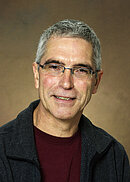Marinus L. Otte, NDSU professor of biological sciences, and Tatiana Lobato de Magalhães of the Universidad Autónoma de Querétaro (UAQ), have produced a documentary titled “Water Talks: Perceptions from Sierra Gorda.” The English version of the film is set to premiere during the 2022 North Dakota Human Rights Film and Arts Festival in Fargo.
The film is scheduled to be shown Saturday, Nov. 5, at 1:30 p.m. at the Fargo Theater. A community conversation will follow.
The documentary is the result on a collaborative project in the Sierra Gorda in the state of Querétaro, Mexico.
“The project was established because I received a Fulbright Specialist award based on my expertise in water and wetlands,” Otte said, noting the work built on previous efforts by colleagues at UAQ.
During filming, the team sought opinions and comments from a variety of people and groups, ranging from village townspeople to government representatives to conservation organizations.
“During an eight-day expedition, we visited many communities and filmed and recorded people about their views on water. They spoke about how the availability and quality of water changed – mostly worsened – over time. How they used to bathe and fish in the water, and about how little of that is still possible,” Otte said. “It shows how people with different perspectives and backgrounds are concerned about different things, but also how they all talk about the same thing. It is easier to get water, but at the same time there is less of it, and the quality of water in general has greatly decreased.”
The movie was edited at UAQ and the Spanish version premiered in Querétaro, Mexico, last February.
According to Otte, UAQ funded much of the project, including sound and film crew and editorial work. His work there, flights and living expenses were supported by the Fulbright Program. NDSU contributed to the English translation and costs related to travel so Lobato can attend the festival.
“The take-home message is that the people in Mexico live in a different place from here, with their own histories and cultures, but the problems they are facing concerning water are the same as they are all over the world,” Otte said. “We depend on water as much as people in the Sierra Gorda, but we all have less of it than before and its quality has declined. The documentary does not present solutions, but intends to initiate more conversations about water.”
Otte joined the NDSU faculty in 2006. He is the editor-in-chief of Wetlands, the scientific journal of the Society of Wetland Scientists. Otte earned his master’s degree and doctorate at Vrije Universiteit, Amsterdam, The Netherlands.
The North Dakota Human Rights Film and Arts Festival, scheduled for Nov. 1-5, is in its sixth season. The festival educates, engages and facilitates discussion on local and worldwide human rights, civil rights and social justice topics through the work of filmmakers and artists. Film screenings, community discussions and educational workshops are free and accessible to all.
As a student-focused, land-grant, research university, we serve our citizens.

